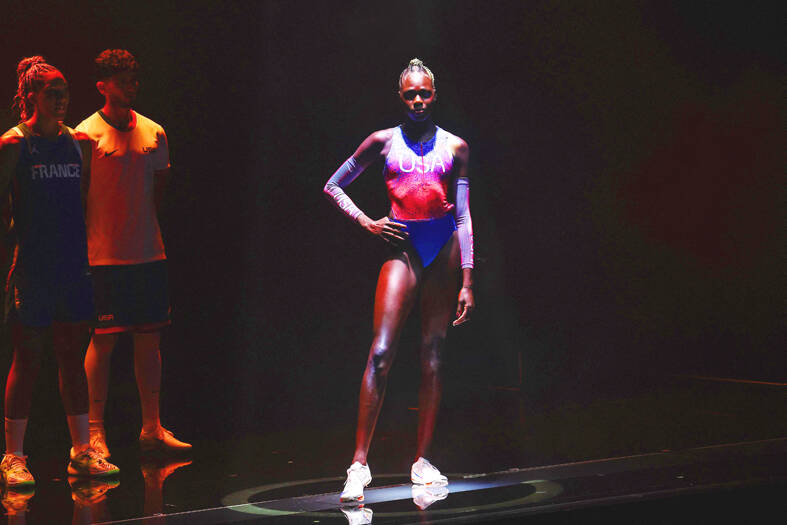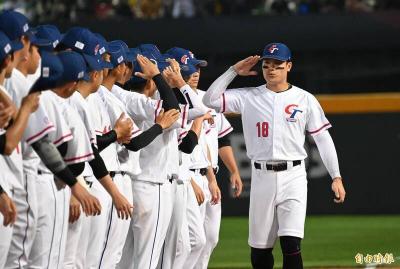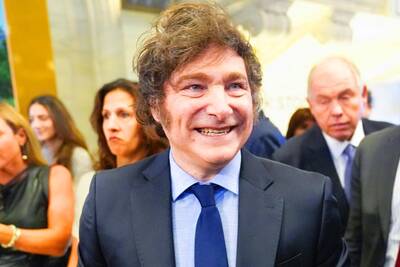US track and field athletes have about four dozen pieces to choose from when assembling their uniforms at the Olympics. The one grabbing the most attention is a high-cut leotard that barely covers the bikini line and has triggered debate between those who think it is sexist and others who say they do not need the Internet to make sure they have good uniforms.
Among those critical or laughing at the uniforms included Paralympian Femita Ayanbeku, sprinter Britton Wilson and even athletes from other countries such as Britain’s Abigail Irozuru, who wrote on social media: “Was ANY female athlete consulted in this team kit?!?”
USA Track and Field (USATF) said uniform maker Nike consulted with several athletes while designing the uniforms, which were unveiled in Paris on Thursday.

Photo: AFP
Among those participating in the rollout were world champion sprinter Sha’Carri Richardson and Olympic gold medalist Athing Mu. Mu wore briefs, while Richardson wore a version of the outfit with shorts, both of which covered more than the version shown on a mannequin that grabbed so much attention.
“They are absolutely not made for performance,” US steeplechaser Colleen Quigley said.
Nike said it worked directly with athletes throughout the design process.
USATF seconded that, saying that “athlete options and choices were the driving force for USATF in the planning process with Nike.”
Katie Moon, the defending Olympic champion in the pole vault who is sponsored by Nike, offered the most impassioned defense of the company on social media.
She said that the leotard shown on the mannequin “was concerning, and warranted the response it received.”
However, female athletes had at least 20 different combinations of uniforms to compete in, and can also choose the styles made for men.
“When you attack the buns and crop top saying something along the lines of it’s ‘sexist’ (which if that was our only choice, it would be), even if it’s with the best of intentions, you’re ultimately attacking our decision as women to wear it,” she said.
Debate has raged for years over more revealing outfits for female Olympians in disciplines from beach volleyball to gymnastics, and some rules on competition wear are changing.
Germany’s women’s gymnastics team wore full-length bodysuits at the Tokyo Olympics, in what they said was a stand against sexualization in the sport. Gymnastics New Zealand last week updated its attire rules to allow women and girls to wear shorts or leggings over their leotards.
Additional reporting by Reuters

The qualifying round of the World Baseball Classic (WBC) is to be held at the Taipei Dome between Feb. 21 and 25, Major League Baseball (MLB) announced today. Taiwan’s group also includes Spain, Nicaragua and South Africa, with two of the four teams advancing onto the 2026 WBC. Taiwan, currently ranked second in the world in the World Baseball Softball Confederation rankings, are favorites to come out of the group, the MLB said in an article announcing the matchups. Last year, Taiwan finished in a five-way tie in their group with two wins and two losses, but finished last on tiebreakers after giving

North Korea’s FIFA Under-17 Women’s World Cup-winning team on Saturday received a heroes’ welcome back in the capital, Pyongyang, with hundreds of people on the streets to celebrate their success. They had defeated Spain on penalties after a 1-1 draw in the U17 World Cup final in the Dominican Republic on Nov. 3. It was the second global title in two months for secretive North Korea — largely closed off to the outside world; they also lifted the FIFA U20 Women’s World Cup in September. Officials and players’ families gathered at Pyongyang International Airport to wave flowers and North Korea flags as the

For King Faisal, a 20-year-old winger from Ghana, the invitation to move to Brazil to play soccer “was a dream.” “I believed when I came here, it would help me change the life of my family and many other people,” he said in Sao Paulo. For the past year and a half, he has been playing on the under-20s squad for Sao Paulo FC, one of South America’s most prominent clubs. He and a small number of other Africans are tearing across pitches in a country known as the biggest producer and exporter of soccer stars in the world, from Pele to Neymar. For

A debate over the soul of soccer is raging in FIFA World Cup holders Argentina, pitting defenders of the social role of the beautiful game against the government of libertarian Argentine President Javier Milei, who wants to turn clubs into for-profit companies. Argentina, which gave the world Diego Maradona and Lionel Messi, is home to some of the world’s most devoted soccer fans — a fact attributed by supporters like Gabriel Nicosia to the clubs’ community outreach. Nicosia is a lifelong supporter of San Lorenzo, a more than 100-year-old first division club based in the working-class Buenos Aires neighborhood of Boedo where